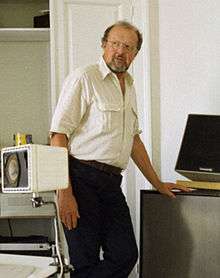Max Neuhaus
| Max Neuhaus | |
|---|---|
 | |
| Background information | |
| Born | August 9, 1939 |
| Died | February 3, 2009 (aged 69) |
| Genres | Avant-garde, experimental |
| Occupation(s) | Public art, sound art, sound installation |
| Years active | 1957–2009 |
| Website | www.max-neuhaus.info |
Max Neuhaus (August 9, 1939 – September 3, 2009) was an American classical musician and artist who was a noted interpreter of the experimental percussion music in the 1960s.[1] He later created numerous permanent sound installations as "sound sculptures" of contemporary art.
Career
Neuhaus was known for his interpretations of experimental percussion music. He gave performances of pieces by composers such as John Cage, Karlheinz Stockhausen and Pierre Boulez in numerous music halls, including a 1964 performance in Carnegie Hall. In 1968, he pursued a career as a contemporary artist by developing sound installations of electronic sounds which would emanate from a source within a particular space or location. One piece called “Times Square” was built in 1977 beneath a grate on a traffic island in Manhattan where pedestrians would be "enveloped by a deeply resonant and mildly undulating drone, its tone suggestive of low-pitched chimes or church bells."[1] Other sculptural works included penny whistles heard underwater in swimming pools, electronic sounds within an arboretum and the modified sounds of listeners whistling tunes over public radio. Permanent works by Neuhaus are found in locations in Houston; Stommeln, Germany; Promenade du Pin, Geneva, Switzerland; and the Dia:Beacon museum in Beacon, New York.[1]
Personal life
Neuhaus was born Aug. 9, 1939 in Beaumont, Texas and attended high school in Houston. He earned bachelor's and master's degrees in music composition from the Manhattan School of Music. Neuhaus was married with two daughters. He died of cancer in his then hometown of Maratea, Italy on February 3, 2009.[1]
References
- 1 2 3 4 Weber, Bruce (February 9, 2009). "Max Neuhaus, Who Made Aural Artwork, Dies at 69". New York Times. p. A20. Retrieved 3 November 2015.
Further reading
- Strongin, Theodore (June 3, 1964). "Concert Is Given By Percussionist". New York Times.
- Goldstein, Malcolm (June 1964). "Neuhaus Realizations". The Village Voice.
- Salzman, Eric (November 1968). "Max Neuhaus' Electronics and Percussion". HiFi Stereo Review.
- Johnson, Tom (October 6, 1976). "Creating the Context: Max Neuhaus". The Village Voice.
- La Barbara, Joan (October 1977). "Max Neuhaus: new sounds in natural settings". Musical America.
- Ammann, Jean-Christophe (1983). "Notes on Max Neuhaus". Max Neuhaus: Sound Installation [German, English]. Kunsthalle Basel.
- Rockwell, John (1983). All American Music: Composition in the Late Twentieth Century. New York: Alfred A. Knopf, Inc. pp. 145–53. ISBN 0-394-51163-8.
- Tomkins, Calvin (October 24, 1988). "HEAR". The New Yorker.
- Danto, Arthur (March 4, 1991). "Max Neuhaus: Sound Works". The Nation.
- Tazzi, Pier Luigi (November 1997). "Constructed Sound: Max Neuhaus". Carte d'Arte Internazionale (Messina).
- Safran, Yehuda (December 2004). "Shaping Sound". Domus 876.
- Loock, Ulrich (2005). "Times Square, Max Neuhaus's Sound Work in New York City". Open: Cahier on Art in the Public Domain.
- Loock, Ulrich (2007). "The Time Piece for the Stommeln Synagogue". Max Neuhaus Time Piece Stomme. Pulheim: Der Bürgermeister.
External links
- Max Neuhaus Official Website
- Auracle
- Dia Art Foundation: Times Square
- Dia Art Foundation: Time Piece Beacon
- Kunsthaus Graz: Time Piece Graz